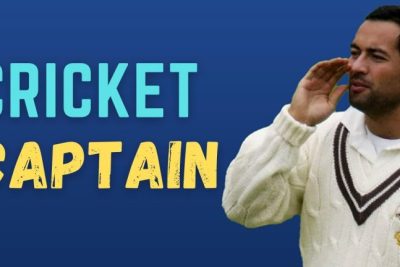The role of a cricket team captain is a pivotal one, often determining the success or failure of a team. Beyond leading the players on the field, a captain must possess exceptional strategic thinking, strong decision-making skills, and the ability to inspire and unite the team. From tactical maneuvers to handling pressure situations, their influence extends far beyond their own performance. In this article, we delve into the crucial responsibilities and qualities that make a great cricket team captain, shedding light on the immense impact they have on the game.
What does the captain do?
Captains play a pivotal role in any team, serving as the driving force behind their success. They are entrusted with the responsibility to perform exceptionally well in high-pressure situations and guide their team to victory. As leaders, captains are expected to exemplify excellence, setting the standard for their teammates to follow. Their ability to maintain control and composure during intense moments is crucial in instilling confidence and motivation within the team.
The role of a captain extends beyond just being a skilled player on the field; they are the embodiment of leadership and inspiration. Captains are not only expected to excel individually but also to elevate the performance of their teammates. They serve as a model of excellence, constantly pushing themselves and others to reach new heights. By leading by example, captains motivate their team to strive for greatness and instill a strong sense of camaraderie and unity.
In the most critical moments, captains are called upon to steer the team towards success. Their ability to make sound decisions under pressure and take charge of the situation is vital. Captains maintain control and provide guidance when the stakes are high, ensuring that their team remains focused and determined. With their exceptional leadership skills and unwavering composure, captains become the rallying point for their teammates, inspiring them to overcome challenges and achieve victory.
What does captain mean in cricket?
In the world of cricket, the captain holds a pivotal role as the leader of the team. Referred to as the skipper, the captain is not just another player on the field, but the appointed leader who carries additional roles and responsibilities. Beyond their own performance, the captain is responsible for making crucial decisions, such as setting the team’s strategy, field placements, and making tactical changes during the game.
With the title of captain comes a multitude of responsibilities that extend beyond the boundaries of the cricket field. Apart from leading the team during matches, the captain is also involved in the selection process, working closely with the team management to choose the best players for each game. Additionally, they act as the spokesperson for the team, representing their players in post-match interviews and press conferences, where they provide insights into the team’s performance and strategies.
The captain’s role in cricket is not just limited to the tactical and strategic aspects of the game. They also play a crucial role in maintaining team spirit, motivation, and discipline. It is the captain’s responsibility to foster a positive team environment, ensuring all players are united and focused on achieving common goals. The captain’s ability to inspire and lead by example is often seen as a determining factor in a team’s success, making their role essential in the world of cricket.
What qualities does a team captain possess?
A team captain possesses several key qualities that set them apart. One of the most important traits is honesty. The best captains are known for their integrity and truthfulness, always speaking the truth and never resorting to deceit. This quality not only earns them the trust and respect of their teammates, but also sets a positive example for others to follow.
In addition to honesty, a team captain must also be trustworthy. They are individuals who can be relied upon to fulfill their commitments and responsibilities. Whether it’s showing up to practice on time, giving their all during games, or supporting their teammates through thick and thin, a trustworthy captain is someone who can be counted on. This reliability creates a sense of stability within the team and fosters a strong sense of unity and camaraderie.
Furthermore, a great team captain is someone who can be trusted with sensitive information. They are excellent listeners and confidants, always keeping the thoughts and emotions shared with them confidential. This ability to maintain privacy allows teammates and coaches to feel comfortable opening up to the captain, knowing that their words will be kept in strict confidence. This creates a safe and supportive environment within the team, where everyone feels valued and heard.
In summary, the qualities of a team captain revolve around honesty and trustworthiness. These individuals are known for their integrity, reliability, and ability to keep things private. By embodying these qualities, team captains not only earn the respect and trust of their teammates, but also contribute to the overall success and cohesiveness of the team.
Mastering the Art of Leadership: The Key to Cricket Team Success
In the realm of cricket, leadership is the catalyst that propels a team to unparalleled success. It is the art of guiding and inspiring individuals to work cohesively towards a common goal. A masterful leader possesses the ability to foster a sense of unity, instill unwavering determination, and extract the best from each team member. The key to a cricket team’s triumph lies in the hands of a skilled leader who can navigate the highs and lows, adapt to ever-changing circumstances, and cultivate a winning mindset among the players. By mastering the art of leadership, a captain can transform a group of individuals into a formidable force, capable of conquering any challenge that comes their way.
To master the art of leadership in cricket, one must possess a deep understanding of the game and its intricacies. A leader must be strategic in their decision-making, analyzing the strengths and weaknesses of both their team and their opponents. They must be able to communicate effectively, ensuring that every player is on the same page and fully committed to the team’s objectives. Additionally, a successful leader in cricket must lead by example, displaying unwavering dedication, resilience, and sportsmanship. When a captain embodies these qualities, they become the driving force behind their team’s success, propelling them to greatness and leaving an indelible mark on the sport.
Unleashing the Captain’s Potential: A Pathway to Triumph
Unleashing the Captain’s Potential: A Pathway to Triumph
In a world of possibilities, lies the untapped potential of a captain waiting to be unleashed. With determination and the right guidance, this potential can be transformed into a triumph that knows no bounds. By harnessing their innate leadership skills and honing their strategic thinking, captains can navigate their teams towards success, even in the face of adversity. Through effective communication, they inspire their crew members, instilling a sense of purpose and unity that propels them towards victory. It is this unleashing of the captain’s potential that sets them apart, paving the way for triumph both on and off the sea.
The pathway to triumph begins with self-discovery and personal growth. Captains must embark on a journey of introspection, uncovering their strengths, weaknesses, and passions. Armed with this self-awareness, they can then seek out opportunities for development, whether through formal education or hands-on experience. As they acquire new knowledge and skills, captains become better equipped to face the challenges that lie ahead. They learn to adapt to changing circumstances, make tough decisions, and inspire their crew through their unwavering commitment. This pathway, though demanding, is the key to unlocking the captain’s potential and paving the way to triumph.
From Vision to Victory: The Ultimate Guide to Captaining a Cricket Team
From Vision to Victory: The Ultimate Guide to Captaining a Cricket Team
Leading a successful cricket team requires more than just technical prowess on the field. It demands a visionary captain who can inspire and strategize, taking their team from mere potential to ultimate triumph. With a keen eye for talent and a deep understanding of the game, a captain must be able to identify the strengths and weaknesses of each player, ensuring they are placed in positions where they can excel. By fostering a culture of teamwork and unity, the captain empowers their team to work together towards a common goal, instilling a sense of determination and resilience that is essential for achieving victory.
However, being a captain is not solely about the game itself; it also involves effective communication and decision-making. A captain must be able to clearly articulate their vision, motivating their team to push beyond their limits. They must make quick and calculated decisions under pressure, analyzing the ever-changing dynamics of the game and adjusting strategies accordingly. With their unwavering focus and ability to lead by example, a captain becomes the driving force that propels their team from vision to victory, leaving a lasting legacy in the annals of cricket history.
In the fast-paced world of cricket, the role of a team captain is indispensable. With a strategic mindset and strong leadership skills, a captain is not only responsible for making crucial decisions on the field, but also for fostering a cohesive and motivated team spirit. From inspiring players to pushing boundaries, a captain acts as the driving force behind a successful cricket team. Ultimately, their ability to navigate the complexities of the game and empower their teammates can make all the difference between victory and defeat.


